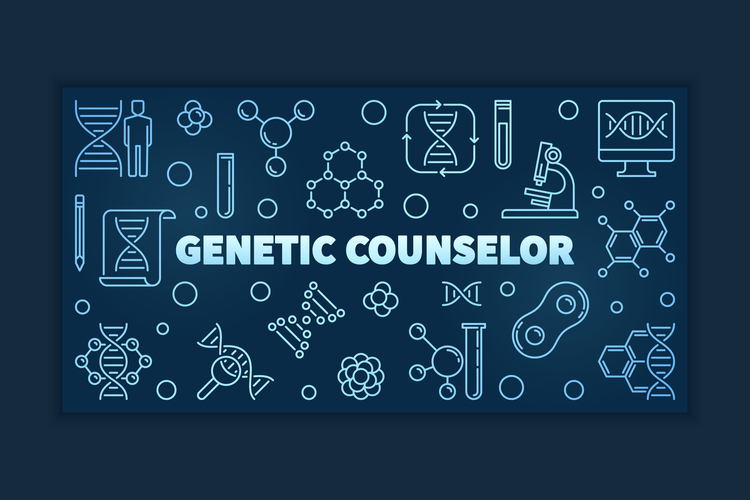
In 1990, the Human Genome Project embarked on a mission to map 20,000 human genes. The project was completed in 2003. Today’s advanced programming explores DNA in a fraction of that time, but the Human Genome project was a milestone. The information gained has proven valuable on many fronts. Reality television has benefitted through public interest in things such as DNA testing to discover ethnic roots. People became fascinated with genealogy, too, but the biggest benefit of the information gleaned through the Human Genome Project has come to genetic counseling. Interest has ballooned, fueling questions like:
• What is genetic counseling?
• How does someone become a genetic counselor?
• What is the genetic counselor job outlook?
This article will attempt to answer those and other questions about genetic counseling.
What is Genetic Counseling?
Based on genetic testing results, counselors help clients in several ways. Couples who want to have children can discover possible genetic abnormalities that could result in birth defects or disease. Adults who have familial histories of heart disease, psychiatric problems, cancers and other conditions can find out if they have genetic factors that could result in the illnesses and take preventative measures early on. The counseling provides a kind of risk assessment and helps families and individuals decide what to do with the test results.
Why Get Genetic Counseling?
Having access to the kind of information genetic testing provides is a game changer in the health field. The thing is, not everyone is equipped to hear the results. For instance, would a person who has a high potential for developing an incurable condition like Alzheimer’s Disease want to know that fact? Additionally, not everyone qualifies for the testing. Couples who have histories of certain conditions might be tested before beginning a family. They would certainly qualify for the testing if amniocentesis showed some abnormalities in the chromosomes, or if they had other children who had been born with certain inherited problems. Expectant mothers over 35 years of age as well as those who have had two or more miscarriages could be tested as well. Adults with family histories of cardiac disease or cancers could be tested to determine their risk factors of developing those problems. All of these might be reasons to seek and be granted genetic testing.
Testing, however, is not counseling. The question was posed, “If a person with a high family incidence of Alzheimer’s disease was tested, would he want to know the results?” Seeing the results on a piece of paper is not the same as having them interpreted by a counselor. Genetic counselors who are not medical professionals can refer people to treatment options. Those who are physicians can provide such treatment. Counselors can explain the test results in a way that supports intervention or merely supports the client.
Recently, inexpensive kits have become available for genetic testing. Some less expensive versions at about $100 per kit are primarily for use in determining ethnicity, and are of questionable reliability. Others are more valid. The testing involves a saliva sample which is mailed to a laboratory. The results are mailed back to the sender within a few weeks. Even with the report, however, users don’t necessarily know what to do with them. What level of probability is concerning, for instance? Where should someone go for treatment options? How can someone accept the possibility of developing a serious, perhaps fatal, condition?
What Genetic Counselors Do

Within this framework of the test results and their human impact, the job of the genetic counselor is to relate and explain the results of the tests as well as helping clients explore their options.
An article in Forbes Magazine points out that, while 74 percent of doctors believe genetics testing is important, fewer than 14 percent feel they are qualified to interpret the results. An estimated 12 million tests are done every year, and the companies that provide the tests are looking at an estimated $22 billion income by 2024.
Tests like those offered through 23and Me and Ancestry are basically infortainment, according to the article. People will learn as much from them as they would by looking at their reflections in the mirror. More serious test kits must be ordered through a doctor. Some private companies that manufacture the test kits provide one-on-one genetic counseling; most don’t.
Counselors not only conduct face-to-face interaction with the clients, but also follow up with their private healthcare providers. To the physicians, they explain statistics, possible outcomes, treatment options, lifestyle modifications and other aspects of the reports.
The tests make almost one million measurements of the genome. Patients who test positive for some components do not necessarily develop the disease. Testing negative does not mean there is no danger of developing the condition. It is highly confusing. In the case of expectant parents who discover that their unborn child has a concerning abnormality, abortion is an option, but so is in-utero treatment. Recently, according to an article in Science Daily, researchers at Carnegie Mellon University have “edited” genes in unborn mice that modified and even cured a disease they carried. In the case of an adult who discovers his propensity to develop a heart condition, the counselor can recommend early healthcare intervention. Unfortunately, some conditions like Alzheimer’s offer futures that are less-than-bright. Counselors may offer the client comfort and advice in planning for the uncertainties of the disease.
Along with acting as consultants for the doctors, genetic counselors are tasked with contacting relatives of the client to inform them that they might have the genetic disposition to developing the disease or condition as well.
Becoming a Genetic Counselor

It begins with a baccalaureate degree. The American Board of Genetic Counseling recommends courses in healthcare, psychology and medical sciences. Earning a Master of Science in Genetic Counseling is the next step. Graduate degree programs include courses such as epidemiology, public health, developmental biology, developmental psychology, patient empathy and others including, of course, genetics. Genetics counselors should pursue certification by the American Board of Genetic Counseling and, if required by the state, licensure.
It is important to remember that the testing and counseling are two different components of genetics. The testing is done by doctors and scientists. These people may or may not be medical doctors, but they all have doctoral degrees. Counselors , by definition, counsel using principles of psychology. While genetics counselors should understand the basic concepts of genetics, their primary professional skill set is in psychology.
After earning a master’s degree, graduates should become certified. This is voluntary, though most employers require certification, and it is necessary in most states for licensure. The applicant must pay the fee, which is $900, before he or she is accepted, and submit a transcript from an accredited genetics counseling program, including the name of the program and the graduation date. The program director must also log on and verify the date the degree was earned. The exam is offered six days a week through February and August. All applications and the exam itself are online. There are 200 questions that must be answered over a period of four hours.
After certification, professionals may acquire continuing education credits through the ABGC.
When a person is deciding on earning a master’s degree in genetic counseling, they may wonder, “How is the job outlook for genetic counselors?” The profession is expected to grow rapidly between 2016 and 2026, with a 29 percent growth rate over those 10 years. The growth is likely due to the increase in the types and numbers of genetic tests available and the willingness of insurance companies to pay for those tests.
Additionally, the positive job outlook for this profession may be partially due to advances in treating abnormalities and diseases pre-birth, and in medical developments in fields like cancer and coronary care. People may be more interested in obtaining genetics tests and counseling when they have options for correcting problems. Another reason for the increased popularity of this career may be the falling cost of the service. As the number of genes identified had risen, the cost of testing and counseling has fallen. The two components are different bills. Testing is the greatest expense, and could amount to several thousand dollars. Genetic counselors typically charge between $150 and $200 per hour. Fortunately, most insurance companies cover both.
Employment Growth By Industry

One way to examine the job growth for genetic counselors is by industry. Local, state and private hospitals employ about 33 percent of genetic counselors, and this proportion of the total employment numbers is expected to remain about the same. Other top industries that employ genetic counselors include the clinics and offices of physicians. Employment in this industry is expected to grow. Other industries that employ genetic counselors include medical and scientific laboratories and colleges, universities and professional schools. About 8 percent of genetic counselors are self-employed.
Job Numbers By State
Some people prefer to search for jobs by starting with the location. It is important to know which states have the highest number of total genetic counseling jobs as well as the highest ratio of genetic counselors per citizens. The state of California has the largest number of genetic counselors, estimated at about 490 workers in this area of expertise. The other top states for total numbers of genetic counselors include Massachusetts, New York, Pennsylvania, and Ohio. States or territories with the highest ratio of genetic counselors include Washington, D.C., Massachusetts, North Carolina, California, and Wisconsin.
Employment of Genetic Counselors By City or Area
Job searchers may also want to take a look at the employment of genetic counselors by city or area in the United States. Most genetic counseling jobs are located within metropolitan areas. This is due to the heavy concentration of research and healthcare facilities in cities. Some of the cities or areas with the greatest numbers of genetic counselors include New York City and Newark, Boston, San Francisco, and Oakland, Washington, D.C. and Alexandria and Minneapolis and St. Paul, explains the Bureau of Labor Statistics.
Where the Growth Will Be for Genetic Counseling Jobs?
The employment opportunities for genetic counselors will be in metropolitan areas with large hospitals, research laboratories, and universities. The cities with the highest expected growth rates for genetic counselors between 2016 and 2026 include Raleigh, Durham and Chapel Hill, San Francisco and Oakland, Boston, Cleveland, and Seattle. Some other cities that are expected to have higher than average growth rates for the employment of genetic counselors include San Jose, Indianapolis, Columbus (Ohio) and Charlotte. Genetic counselors who are bilingual or who have a background in counseling and research may have the best employment prospects.
The bottom line in the question of genetic counselor job outlook is that there are only 4,900 certified genetics counselors in the United States, according to the previously-cited Forbes article. That means only one-in-one-hundred-thousand people have access to this professional. Additionally, only there are only 43 accredited training programs.
Help may be coming in the form of artificial intelligence. Programs are being developed that will allow users to “chat” with a virtual counselor, and another AI development will use software to identify treatment resources based upon individual DNA profiles. Still, developers stress that these things will only augment the abilities of the genetics counselors, not supplant human interactions. Genetic counselors have the “high-touch” ability to have “strong and difficult conversations with families about decisions that tie into using those technologies.”
Knowing the job outlook for a profession makes it possible for a person to know if they will have a relatively easy time finding employment in the field. This area of expertise will continue to grow as more genetic tests become available and people rely on those tests for making informed decisions about their own and their child’s healthcare. Knowing the answer to “How is the job outlook for genetic counselors?” also helps a person plan where to live and where to search for employment opportunities.
The Future of Genetics Counselors
Genomic data will soon be used as a normal part of patient care, and doctor visits that are already strained for patient-doctor time will be stressed even more. Genetics counselors may become part of the digital resources offered routinely to patients along with their doctor visits. Additionally, the testing results are already being integrated into digital patient files, to be immediately available to patients and their physicians. Both will need the input of genetics counselors to interpret that data. Plus, scientists originally had the ability to test genomes for one factor, but they now test for many factors at once. That means counselors will have to address these additional findings with their clients as well as clinicians and the public. There will also be a need for educating the public about the limitations of genetics counseling and the ethics that are involved such as confidentiality. In short, the need for these professionals will only increase with time. As long as there are so few programs to train them, there will be a dearth of genetic counselors and their services will be at a premium. That means high job availability, high salaries and a glowing future for the profession.
Related Resources: